Articles
Untrustworthy news sites could be flagged automatically in UK | The Guardian
From the horse’s mouth
NewsGuard
My Comments
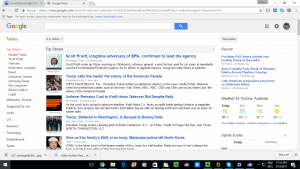
Google News – one of the way we are reading our news nowadays
Since 2016 with the Brexit referendum and the US Presidential Election that caused outcomes that were “off the beaten track”, a strong conversation has risen up about the quality of news sources, especially online sources.
This is because most of us are gaining our news through online resources like online-news aggregators like Google News, search engines like Google or Bing, or social networks like Facebook or Twitter. It is while traditional media like the newspapers, radio or TV are being seen by younger generations as irrelevant which is leading to these outlets reducing the staff numbers in their newsrooms or even shutting down newsrooms completely.
What has been found is that this reliance on online news and information has had us become more susceptible to fake news, disinformation and propaganda which has been found to distort election outcomes and draw in populist political outcomes.
Increasingly we are seeing the rise of fact-checking groups that are operated by newsrooms and universities who verify the kind of information that is being run as news. We are also seeing the electoral authorities like the Australian Electoral Commission engage in public-education campaigns regarding what we pass around on social media. This is while the Silicon-Valley platforms are taking steps to deal with fake news and propaganda by maintaining robust account management and system-security policies, sustaining strong end-user feedback loops, engaging with the abovementioned fact-check organisations and disallowing monetisation for sites and apps that spread misinformation.
Let’s not forget that libraries and the education sector are taking action to encourage media literacy amongst students and library patrons. With this site, I even wrote articles about being aware of fake news and misinformation during the run-up to the UK general election and the critical general elections in Australia i.e. the NSW and Victoria state elections and the Federal election which were running consecutively over six months.
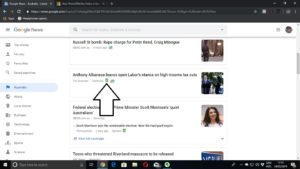
NewsGuard highlighting the credibility of online news sources it knows about on Google News
But a group of journalists recently worked on an online resource to make it easy for end-users to verify the authenticity and trustworthiness of online news resources. NewsGuard, by which this resource is named, assesses the online news resources on factors like the frequency it runs with false content; responsible gathering and presentation of information; distinguishing between news and opinion / commentary; use of deceptive headlines and proper error handling. Even factors that affect transparency like ownership and financing of the resource including ideological or political leanings of those in effective control; who has effective control and any possible conflicts of interest; distinction between editorial and advertising / paid content; and the names of the content creators and their contact or biographical information.
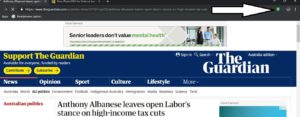
The NewsGuard “pilot light” on Chrome’s address bar indicating the trustworthiness of a news site
End-users can use a plug-in or extension for the popular desktop browsers which will insert a “shield” behind a Weblink to a news resource indicating whether it is credible or not, including whether you are simply dealing with a platform or general-info site or a satire page. They can click on the shield icon to see more about the resource and this resource is even described in an analogous form to a nutrition label on packaged foodstuffs.
For the Google Chrome extension, there is also the shield which appears on the address bar and changes colour according to how the Web resource you are reading has been assessed by NewsGuard. It is effectively like a “pilot light” on a piece of equipment that indicates the equipment’s status such as when a sandwich toaster is on or has heated up fully.
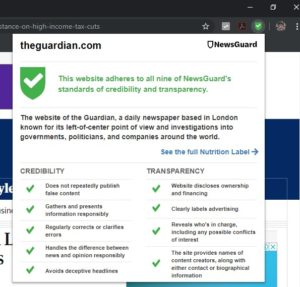
Basic details being shown about the trrustworthiness of online news site if you click on NewsGuard “pilot light”
It is also part of the package for the iOS and Android versions of Microsoft Edge but it will take time for other mobile browsers to provide this as an option.
NewsGuard is a free service with it gaining a significant amount of funding from the Microsoft’s Defending Democracy program. This is a program that is about protecting democratic values like honest and fair elections.
It is also being pitched towards the online advertising industry as a tool to achieve a brand-safe environment for brands and advertisers who don’t want anything to do with fake news and disinformation. This will be positioned as a licensable data source and application-programming interface for this user group to benefit from. Libraries, educational facilities, students and parents are also being encouraged to benefit from the NewsGuard browser add-ons as part of their media-literacy program and curriculum resources.
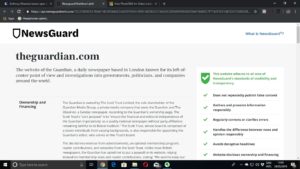
Click further to see a detailed “nutrition label” report about the quality and trustworthiness of that online news resource
But I see it also of benefit towards small newsrooms like music radio stations who want to maintain some credibility in their national or international news coverage. Here, they can make sure that they use news from trusted media resources for their news output like the “top-of-the-hour” newscast. Students, researchers, bloggers and similar users may find this of use to make sure that any media coverage that they cite are from trustworthy sources.
The UK government are even considering this tool as a “must-have” for Internet service providers to provide so that British citizens are easily warned about fake news and propaganda. It is in the same approach to how users there can have their ISPs provide a family-friendly “clean feed” free of pornography or hate speech.
It is now being rolled out around the rest of Europe with France and Italy already on board with this service for their mastheads. Germany is yet to come on board but it could be a feasible way to have other countries speaking the same language climbing on board very quickly such as having Germany, Austria and Switzerland come on board very quickly once German presence is established.
As NewsGuard rolls out around the world, it could effectively become one of the main “go-to” points to perform due-diligence research on that news outlet or its content. It will also become very relevant as our news and information is delivered through podcasts and Internet-delivered radio and TV broadcasts or we use Internet-connected devices to receive our news and information.


